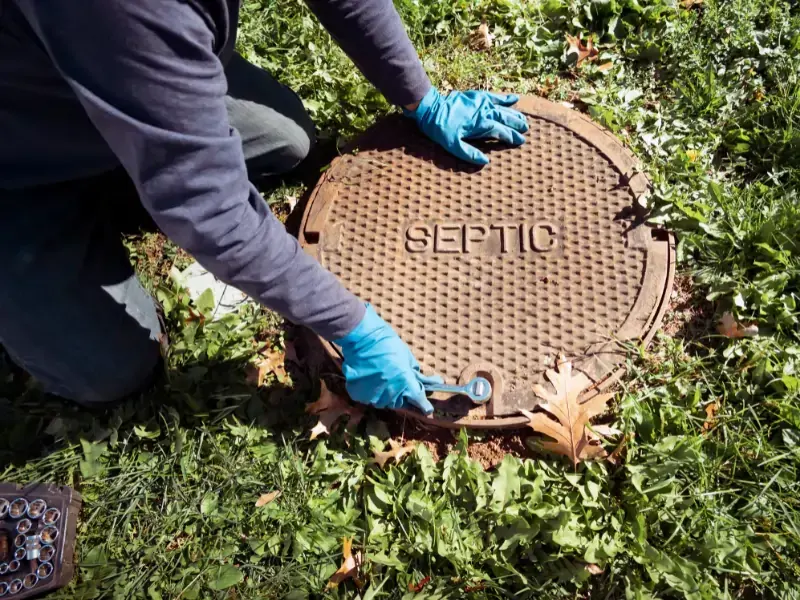Why do septic tanks smell?
Uh, oh. That telltale smell that makes you wrinkle your nose and wonder, "What on earth is that?" More often than not, if you're a septic tank owner, that unwelcome aroma is a sign your system is trying to tell you something. And it's usually not good news.
But don't worry, and you've come to the right place! We'll break down why these odours occur, from the usual suspects like bacterial imbalances and overloaded systems, and even how the weather can play a role.
More importantly, we're not just going to leave you hanging with a smelly problem. We'll also dive into practical steps you can take to get rid of those unpleasant odours and how to prevent them from making a stinky comeback.
Whether you're a seasoned septic system owner or new to the world of wastewater management, this page has the answers you need to keep your nose happy and your system healthy.

Common Causes of Septic Tank Smells
So, what exactly causes that unpleasant smell? Well, septic tank odours can arise from a few different issues; here are some of the most common culprits:
❌ A Full Tank
This is the most frequent reason for stinky situations. When your tank is overloaded with solids, there's less room for the liquids, and the whole system gets backed up. This can cause gases, which would normally stay in the tank, to escape and make their way into your garden or even your house.
❌ Bacterial Imbalance
Your septic tank needs good bacteria to break down waste. If this bacteria is off balance, it can lead to poor waste breakdown and, you guessed it, nasty smells. Things that can disrupt this balance include harsh chemicals, excessive use of antibacterial products, and even certain medications.
❌ Blocked Drains
If something is blocking the flow of wastewater, it can cause a backup in the system. This can lead to those yucky odours escaping through the vents or even back up into your home.
❌ Ventilation Issues
Your septic system has a venting system that allows gases to escape safely. If this system isn't working correctly, due to a blockage, damage, or incorrect installation, those gases can't escape properly and you'll soon notice the smell!
❌ Damaged Components
Cracks in the tank, damaged pipes, or a failing absorption trench can all lead to leaks and the release of badly smelling gases.
Understanding these common causes can help you identify the source of the smell and take the necessary steps to fix it.

What Can I Do to Get Rid of the Bad Odours?
Okay, so you've got a smelly situation on your hands. What can you do about it? Here are some steps you can take to get rid of the stink:
🕵️ Identify the Source
Before you start tackling the smell, try to figure out where it's coming from. Is it strongest near the tank, the drainfield, or inside your house? This will help you pinpoint the problem.
🕵️ Check for Simple Solutions
Sometimes, the solution is a simple one. Check the septic tank vents aren't blocked. If the smell is coming from a specific drain, try running some water down it to ensure the drain trap is filled.
⛽ Pump Your Tank
If it's been a while since your last pump-out, your tank might be full. Pumping the tank can often eliminate the odor and resolve the underlying issue.
🦠 Address the Bacterial Balance
If you suspect a bacterial imbalance, you can try septic tank additives that help restore the beneficial bacteria. However, be cautious about using harsh chemicals, as these can make the problem worse in the long run.
💥 Inspect for Damage
If you suspect damaged components, such as cracks or leaks, it's important to get them checked by a professional.
📲 Call in the Professionals
If you've tried the DIY solutions and the smell persists, it's time to call a septic service professional, like Express Wastewater Solutions. We can diagnose the problem and recommend the best course of action.
Remember, fixing smelly septic tanks is crucial for maintaining a healthy environment and preventing further damage to your system.

Preventing Septic Tank Odours
The best way to deal with septic tank smells is to prevent them in the first place. Preventative steps you can take include:
✔️ Regular Pumping
✔️ Water Conservation to Reduce Wastewater
✔️ Regular Septic System Inspections
✔️ Clear Working Ventilation Pipes
✔️ Clear Absorption Field
Things that should NOT go into a septic system:
❌ Fat & Oil
❌ Disposable Nappies
❌ Personal Hygiene Products
❌ Disposable Wipes
❌ Excessive Bleach & Drain Cleaners
Read more about the Dos and Don’ts of Septic Systems
DIY vs Professional Help for Septic Tank Smells
When those septic tank smells hit, you might be tempted to put on your DIY hat and try to fix the problem yourself. But how do you know when it's safe to handle the issue on your own and when it's time to call in the pros?
DIY Solutions
For minor odour problems, you can try these DIY fixes yourself, if you feel confident to do so:
🔧 Make sure there are no obstructions in your septic tank’s vents.
🔧 Try running water down the drain for a few minutes if you suspect the issue may be a dry drain trap.
🔧 Try adding a cup of baking soda to the toilet once a week to flush your septic system.
When to Call the Professionals at Express Wastewater Solutions
If you are experiencing persistent bad odours coming from your septic system, and your DIY efforts have not worked, it’s time to call the pros! It’s best to call for help if:
👷 The smell is strong and persistent.
👷 You suspect a leak, or damage, to your septic tank, or pipes.
👷 You’re unsure why your septic system is smelly and need a professional diagnosis.
👷 You do not have the expertise or tools to safely and effectively resolve your smelly issue.
Remember: When in doubt, it's always best to call a professional! Septic system problems can be expensive and hazardous if not rectified properly.
Smelly Septic System Summary
Septic tank odours can be caused by a variety of issues, including a full tank, bacterial imbalance, clogged drains, ventilation problems, and damaged components.
If you’re unsure at all, or have further questions regarding your septic system, call our friendly team at Express Wastewater Solutions on 1300 770 594 today.

Resources:
Australian Department of Health - The septic tank
WA Department of Health - Understanding Septic Tank Systems
NSW Government - The Easy Septic Guide
SA Government - Maintenance of septic tank systems
Noosa Council - On-Site Waste Water Facilities
QLD Plumbing and Drainage Act